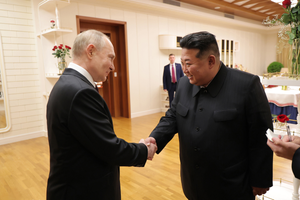Washington: The United States reiterated on Wednesday that growing cooperation between Russia and North Korea is a trend of “great concern”, after Pyongyang and Moscow signed a pact calling for mutual aid if either side comes under attack.
A State Department spokesperson made the point after Russian President Vladimir Putin and North Korean leader Kim Jong-un inked a “comprehensive strategic partnership” treaty at a summit in Pyongyang on Wednesday (Korea time) amid concerns about the security implications of their military ties.
“Deepening cooperation between Russia and the DPRK is a trend that should be of great concern to anyone interested in maintaining peace and stability on the Korean Peninsula, upholding the global non-proliferation regime, abiding by U.N. Security Council resolutions, and supporting the people of Ukraine as they defend their freedom and independence against Russia’s brutal invasion,” the spokesperson told Yonhap News Agency via email.
“As we have said before, we don’t believe any country should give Mr. Putin a platform to promote his war of aggression against Ukraine,” the official added.
The spokesperson also stressed that Russia is “blatantly violating the U.N. Charter and working to undermine the international system.”
“We cannot turn a blind eye to the clear violations of international law Russia has committed in Ukraine,” the spokesperson said, reported Yonhap News Agency.
A Pentagon official gave a cautious response, saying that it is aware of the reports on the summit between Putin and Kim.
“We’ve seen the reports and will continue to monitor the situation,” the official said in response to a question from Yonhap News Agency. “We have nothing further to offer right now.”
The Pyongyang summit came amid deepening concerns that military cooperation between Pyongyang and Moscow would help prop up Russia’s war effort in Ukraine and advance North Korea’s weapons programs to the detriment of regional and global security.
–IANS


Comments are closed.